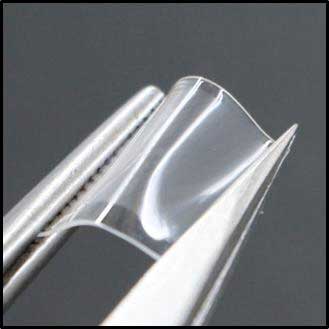| Jun 16, 2020 | |
Wearable patch may provide new treatment option for skin cancer(Nanowerk News) Conventional melanoma therapies, including chemotherapy and radiotherapy, suffer from the toxicity and side effects of repeated treatments due to the aggressive and recurrent nature of melanoma cells. |
|
| Less invasive topical chemotherapies have emerged as alternatives, but their widespread uses have been hindered by both the painful size of the microneedles and the rapidly dissolving behavior of polymers used in the treatments. | |
| Now, Purdue University innovators have created a novel wearable patch to help address the issues and provide an improved treatment experience for people with melanoma. The technology is published in the journal ACS Nano ("Bioresorbable, Miniaturized Porous Silicon Needles on a Flexible Water-Soluble Backing for Unobtrusive, Sustained Delivery of Chemotherapy"). | |
 |
|
| Purdue University innovators developed a bioresorbable wearable skin patch comprised with fully miniaturized silicon needles for the management of skin cancers. (Image: Purdue University/Chi Hwan Lee) | |
| "We developed a novel wearable patch with fully miniaturized needles, enabling unobtrusive drug delivery through the skin for the management of skin cancers," said Chi Hwan Lee, a Purdue assistant professor of biomedical engineering and mechanical engineering. "Uniquely, this patch is fully dissolvable by body fluids in a programmable manner such that the patch substrate is dissolved within one minute after the introduction of needles into the skin, followed by gradual dissolution of the silicon needles inside the tissues within several months." | |
| Lee said this gradual slow dissolution of the silicon nanoneedles allows for long-lasting and sustainable delivery of cancer therapeutics. | |
| "The uniqueness of our technology arises from the fact that we used extremely small but long-lasting silicon nanoneedles with sharpened angular tips that are easy for their penetration into the skin in a painless and minimally invasive manner," Lee said. | |
| The Purdue innovators developed a novel design of bioresorbable silicon nanoneedles that are built on a thin, flexible and water-soluble medical film. The water-soluble film serves as a temporary holder that can be conformably interfaced with the soft, curvilinear surface of the skin during the insertion of the nanoneedles, followed by rapid, complete dissolution within a minute. | |
| The surface of the nanoneedles is configured with nanoscale pores and provides a large drug loading capacity comparable to those using conventional microneedles. | |
| Lee said the nanoneedles could deliver the chemotherapeutic drugs to target melanoma sites in a sustainable manner. The silicon nanoneedles are biocompatible and dissolvable in tissue fluids, such that they can be completely resorbed in the body over months in a harmless manner. |
| Source: Purdue University | |
|
Subscribe to a free copy of one of our daily Nanowerk Newsletter Email Digests with a compilation of all of the day's news. |
